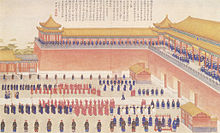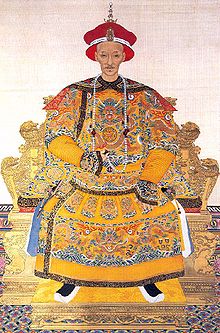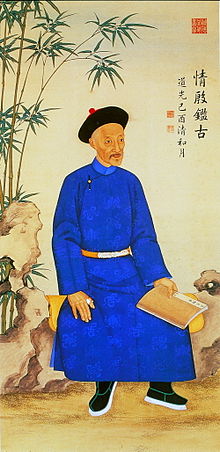- Daoguang Emperor
-
Daoguang Emperor  8th Qing Emperor of China
8th Qing Emperor of ChinaReign 3 October 1820 – 25 February 1850
(29 years, 145 days)Predecessor Jiaqing Emperor Successor Xianfeng Emperor Spouse Empress Xiaomucheng
Empress Xiaoshencheng
Empress Xiaoquancheng
Empress XiaojingchengIssue Yiwei, Prince Yin
Princess Duanmin
Princess Duanshun
Princess Shou-an
Yikang, Prince Shun
Princess Shouzang
Yichi, Prince Hui
Princess Shouyen
Yichu, Xianfeng Emperor
Yicong, Prince Tun
Yixin, Prince Gong
Yixuan, Prince Chun
Princess Shouxi
Princess Shouzhuang
Yiho, Prince Zhong
Yihui, Prince FuFull name Chinese: Aixin-Jueluo Miánníng 愛新覺羅綿寧, later Mínníng
Manchu: Aisin-Gioro hala i Min NingPosthumous name Emperor Xiàotiān Fúyùn Lìzhōng Tǐzhèng Zhìwén Shèngwǔ Zhìyǒng Réncí Jiǎnqín Xiàomǐn Kuāndìng Chéng
效天符運立中體正至文聖武智勇仁慈儉勤孝敏寬定成皇帝Temple name Qing Xuānzōng
清宣宗Father Jiaqing Emperor Mother Empress Xiao Shu Rui Born 16 September 1782
Forbidden City, BeijingDied 25 February 1850 (aged 67)
Old Summer Palace, BeijingBurial Western Qing Tombs The Daoguang Emperor (Chinese: 道光帝, pinyin: Dàoguāngdì, Wade-Giles: Tao-kuang; Manchu: ᡩᠣᡵᠣ ᡝᠯᡩᡝᠩᡤᡝ, Doro Eldengge Hūwangdi; 16 September 1782 – 25 February 1850) was the eighth emperor of the Manchurian Qing dynasty and the sixth Qing emperor to rule over China, from 1820 to 1850.
Contents
Early years
He was born in the Forbidden City, Beijing, and was given the name Mianning (綿寧), changed into Minning (旻寧; Manchu: ᠮᡳᠨ ᠨᡳᠩ Min ning) when he became emperor: the first character of his private name was changed from Mian (綿) to Min (旻) so as to avoid the relatively common Mian character. This novelty was introduced by his grandfather the Qianlong Emperor who thought it not proper to use a common character in the emperor's private name due to the long-standing practice of naming taboo.
He was the second son of Yongyan (永琰), who became the Jiaqing Emperor in 1796. His mother, the principal wife of Yongyan, was Lady Hitara of the (Manchu) Hitara clan, who became empress when Jiaqing ascended the throne in 1796. She is known posthumously as Empress Xiaoshu Rui (孝淑睿皇后).
Mianning was well liked by his grandfather the Qianlong Emperor and frequently accompanied the elderly emperor on hunting trips. On one such trip at the age of nine he successfully hunted a deer which greatly amused Qianlong. In 1813, while a prince, Mianning also played a vital role in repelling and killing White Lotus invaders who stormed the Forbidden City. This action earned Mianning important merits in securing his claim for the throne.
Reign as emperor and the opium trade
 The Emperor is presented with prisoners of the East Turkestan campaign at the Wu-men in 1828
The Emperor is presented with prisoners of the East Turkestan campaign at the Wu-men in 1828
In September 1820, at the age of 38, Mianning inherited the throne after his father the Jiaqing Emperor suddenly died of unknown causes. Now known as the Daoguang Emperor, he inherited a declining empire with Western imperialists encroaching upon the borders of China. During his reign, China experienced major problems with opium, which was imported into China by British merchants. Opium had started to trickle into China during the reign of his great grandfather Emperor Yongzheng but was limited to approximately 200 chests annually. By the time of Emperor Qianlong's reign, this amount had increased to 1000 chests, 4000 chests by Jiaqing's era and more than 30,000 chests during Daoguang's reign. He issued many edicts against opium in the 1820s and 1830s, which were carried out by Commissioner Lin Zexu. Lin Zexu's effort to halt the spread of opium in China led directly to the First Opium War. With the development of the Opium War, Lin was made a scapegoat and the Daoguang emperor removed Lin's authority and banished him to Yili. Meanwhile in the Himalayas, the Sikh Empire attempted an occupation of Tibet but where defeated in the Sino-Sikh war (1841-1842). But on the coasts, technologically and militarily inferior to the European powers, China lost the war and surrendered Hong Kong by way of the Treaty of Nanking in August 1842.
Court intrigues and incidents
In 1831 Daoguang killed his own 23 year old son after striking him.[1] In 1831 an attempt was made to usurp the throne and oust Daoguang by someone else.[2] In 1850 this happened again, though it did not succeed.[3]
Anti-Christianity
In 1811 a clause sentencing Europeans to death for spreading Catholicism had been added to the statute called "Prohibitions Concerning Sorcerers and Sorceresses" (禁止師巫邪術) in the Great Qing Code.[4] Protestants hoped that the Chinese government would discriminate between Protestantism and Catholicism, since the law mentioned the latter by name, but after Protestant missionaries gave Christian books to Chinese in 1835 and 1836, the Daoguang Emperor demanded to know who were the "traitorous natives" in Canton who had supplied them with books. The foreign missionaries were strangled or expelled by the Chinese.[4]
Family
- Father: Emperor Jiaqing (嘉庆帝).
- Mother: Empress Xiao Shu Rui (孝淑睿皇后).
Consorts[5]
- Empress Xiaomucheng (孝穆成皇后) (?–1808) of the Niohuru clan.
- Empress Xiaoshencheng (孝慎成皇后) (?–1833) of the Tunggiya clan.
- Empress Xiaoquancheng (孝全成皇后) (1808–1840) of the Niohuru clan.
- Empress Xiaojingcheng (孝静成皇后) (1812–1855) of the Borjigit clan.
- Imperial Noble Consort Zhuang Shun (庄顺皇贵妃) (?–1867) of the Wuya clan, she was the natural birth mother of the First Prince Chun.
- Noble Consort Tóng (彤贵妃) (?–1877) of the Sumuru clan.
- Noble Consort Jia (佳贵妃) (?–1890) of the Gogiya clan.
- Noble Consort Cheng (成贵妃) (?–1888) of the Niohuru clan.
- Consort He (和妃) (?–1836) of the Nara clan.
- Consort Xiang (祥妃) (?–1861) of the Niohuru clan.
- Consort Chang (常妃) (?–1860) of the Heseri clan. She died during the burning of the Yuan Ming Yuan summer palace.
- Imperial Concubine Zhen (珍嫔) (?) of the Heseri clan. She was not interred in the Muling mausoleum for imperial concubines.
- Imperial Concubine Tian (恬嫔) (?-1845) of the Fuca clan.
- Imperial Concubine Yu (豫嫔) (1816–1898) of the Shanggiya clan.
- Imperial Concubine Shun (順嬪) (?-1868) of the Shiqi clan.
- Imperial Concubine Heng (恆嬪) (?-1876) of the Càigiya clan.
- Worthy Lady Ping (平贵人)(?-1823) née Zhao.
- Worthy lady Ting (定贵人)(?-1842) née Sun.
- Worthy Lady Li (李贵人)(?-1872).
- Worthy Lady Na (那贵人)(?-1865).
Children
Sons
- First son: Prince Yiwei (奕緯) (16 May 1808 – 23 May 1831), son of Consort He of the Nara clan.
- Second son: Yikang (奕綱) (22 November 1826 – 5 March 1827), son of Empress Xiaojingcheng
- Third son: Yichi (奕繼) (2 December 1829 – 22 January 1830), son of Empress Xiaojingcheng
- Fourth son: Yichu (1831–1861), future Xianfeng Emperor, son of Empress Xiaoquancheng
- Fifth son: (奕誴)Yicong (23 July 1831 – 18 February 1889), the second Prince Tun, great-grandfather of Prince Yuyan and son of Imperial Consort Xiang (祥妃) of the Niohuru clan.
- Sixth son: (奕訢)Yixin (11 January 1833 – 29 May 1898), the Prince Gong. Son of Empress Xiaojingcheng.
- Seventh son: Yixuan, the First (16 October 1840 – 1 January 1891) Prince Chun. Father of Zaitian the Guangxu Emperor.
- Eight son: Yiho (奕詥) (21 February 1844 – 17 December 1868), son of the Imperial Noble Consort Zhuangshun.
- Ninth son: Yihui(奕譓) (1845–1877) son of the Imperial Noble Consort Zhuangshun.
Daughters
- First daughter: State Princess Duanmin (端悯固伦公主) (1813–1819), daughter of Empress Xiaoshencheng.
- Second daughter: (1825), daughter of Consort Xiang.
- Third daughter: State Princess Duanshun (端顺固伦公主) (1825–1835), daughter of Empress Xiaoquancheng.
- Fourth daughter: State Princess Shou-An (寿安固伦公主) (1826–1860), daughter of Empress Xiaoquancheng.
- Fifth daughter: Princess of the second rank Shou-Zang (寿臧和硕公主) (1829–1856), daughter of Consort Xiang.
- Sixth daughter: State Princess Shou-En (寿恩固伦公主) (1830–1859), daughter of Empress Xiaojingcheng.
- Seventh daughter: (1840–1844), daughter of Noble Consort Tun.
- Eight daughter: Princess of the second rank Shou-Xi (寿禧和硕公主) (1841–1866), daughter of Noble Consort Tun.
- Ninth daughter: State Princess Shou-Zhuang (寿庄固伦公主) (1842–1884), daughter of Imperial Noble Consort Zhuangshun.
- Tenth daughter: (1844–1845), daughter of Noble Consort Tun.
Death and legacy
Daoguang died on 25 February 1850, at the Old Summer Palace (圓明園), 8 km/5 miles northwest of the walls of Beijing. He was succeeded by his eldest surviving son. Daoguang failed to understand the intention or determination of the Europeans, or the basic economics of a war on drugs. Although the Europeans were outnumbered, outgunned and were thousands of miles away from home, they could bring far superior fire power to bear at any point of contact along Chinese coast. The Manchu court was highly dependent on the continued flow of tax/levy payment from southern China via the Grand Canal, which was easily cut off by the British expeditionary force at ZhenJiang. He had a poor understanding of the British and the industrial revolution that Britain had undergone, preferring to turn a blind eye to the rest of the world. It was said that Daoguang did not even know where Britain was located in the world. His thirty-year reign introduced the initial onslaught by western imperialism and foreign invasions that would plague China, in one form or another, for the next one hundred years.
He was interred in the Muling (慕陵 - meaning "Tomb of longing", or "Tomb of admiration") mausoleum, which is part of the Western Qing Tombs (清西陵), 120 kilometers/75 miles southwest of Beijing.
Sources
- The history of China, Volume 2 by Demetrius Charles the Kavanagh Boulger. Publisher: W. Thacker & co., 1898
- The Last Emperors "A Social History of Qing Imperial Institutions", Evelyn S. Rawski. ISBN 0-520-22837-5
- Daily life in the Forbidden City, Wan Yi, Wang Shuqing, Lu Yanzhen. ISBN 0-670-81164-5.
- Draft history of the Qing dynasty. 《清史稿》
References
 This article incorporates text from China in the light of history, by Ernst Faber, a publication from 1897 now in the public domain in the United States.
This article incorporates text from China in the light of history, by Ernst Faber, a publication from 1897 now in the public domain in the United States. This article incorporates text from China in the light of history, by Ernst Faber, a publication from 1897 now in the public domain in the United States.
This article incorporates text from China in the light of history, by Ernst Faber, a publication from 1897 now in the public domain in the United States. This article incorporates text from The Chinese recorder, Volume 27, a publication from 1896 now in the public domain in the United States.
This article incorporates text from The Chinese recorder, Volume 27, a publication from 1896 now in the public domain in the United States. This article incorporates text from Life among the Chinese: with characteristic sketches and incidents of missionary operations and prospects in China, by Robert Samuel Maclay, a publication from 1861 now in the public domain in the United States.
This article incorporates text from Life among the Chinese: with characteristic sketches and incidents of missionary operations and prospects in China, by Robert Samuel Maclay, a publication from 1861 now in the public domain in the United States.
- ^ Ernst Faber (1897). China in the light of history. American Presbyterian mission press. p. 18. http://books.google.com/books?id=WvpWAAAAMAAJ&q=the+emperor+tao+kwang%27s+son+died+in+1831+at+the+age+of+twenty+from+a+blow+inflicted+by+his+father#v=snippet&q=%20tao%20kwang's%20son%20died%20%201831%20age%20twenty%20from%20a%20blow%20inflicted%20by%20his%20father&f=false. Retrieved 2011-06-06.
- ^ The Chinese recorder, Volume 27. American Presbyterian Mission Press. 1896. p. 242. http://books.google.com/books?id=lNAWAQAAIAAJ&pg=PA242&dq=the+emperor+tao+kwang's+son+died+in+1831+at+the+age+of+twenty+from+a+blow+inflicted+by+his+father#v=onepage&q=the%20emperor%20tao%20kwang's%20son%20died%20in%201831%20at%20the%20age%20of%20twenty%20from%20a%20blow%20inflicted%20by%20his%20father&f=false. Retrieved 2011-06-06.
- ^ Ernst Faber (1897). China in the light of history. American Presbyterian mission press. p. 18. http://books.google.com/books?id=S2hCAAAAIAAJ&pg=PA18&dq=the+emperor+tao+kwang's+son+died+in+1831+at+the+age+of+twenty+from+a+blow+inflicted+by+his+father#v=onepage&q=the%20emperor%20tao%20kwang's%20son%20died%20in%201831%20at%20the%20age%20of%20twenty%20from%20a%20blow%20inflicted%20by%20his%20father&f=false. Retrieved 2011-06-06.
- ^ a b Robert Samuel Maclay (1861). Life among the Chinese: with characteristic sketches and incidents of missionary operations and prospects in China. Carlton & Porter. p. 336–337. http://books.google.com/books?id=BZAPAAAAIAAJ. Retrieved 6 Jul 2011.
- ^ Draft history of the Qing dynasty. 《清史稿》卷二百十四.列傳一.后妃傳.
Ancestry
Ancestors of the Daoguang Emperor Kangxi Emperor Yongzheng Emperor Empress Xiaogongren Qianlong Emperor Niuhuru Lingzhu Empress Xiaoshengxian Jiaqing Emperor Wei Qingtai Weijiya, Empress Yi Chun Minning, Daoguang Emperor Empress Xiaoshurui Daoguang EmperorHouse of Aisin-GioroBorn: 16 September 1782 Died: 25 February 1850Regnal titles Preceded by
The Jiaqing EmperorEmperor of China
1820–1850Succeeded by
The Xianfeng EmperorCategories:- 1782 births
- 1850 deaths
- 19th-century Chinese monarchs
- Manchu people
- Qing Dynasty emperors
Wikimedia Foundation. 2010.



